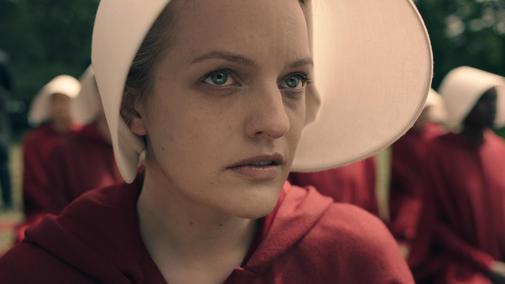By Spencer Coile
Mad Men ended almost two years ago. For many fans, it was the end of an era as we watched Don Draper spiral out of control, while Peggy Olson climbed the ladder to success. It was a story many of us cherished for its seven year run. Importantly, though, it was the series that catapulted Elisabeth Moss to stardom. Sure, she had stints on The West Wing and later found success in film and on Broadway, but it was Mad Men that helped pave the way for Moss to be where she is now. For many fans (myself included), we found ourselves wondering when Moss would claim another role that used her incredible, chameleon-esque acting abilities the same way Mad Men did.
And then Hulu ordered a straight-to-series 10 episode adaptation of Margaret Atwood's 1985 novel, A Handmaid's Tale. After its premiere (today), it is safe to say that Elisabeth Moss is back. And better than ever. Of course, she is not the only stellar quality to the series. After the jump, a review of the first two episodes of The Handmaid's Tale. And boy, are they doozies...
Taking place in a dystopian, not-so-distant future where most women are infertile, The Handmaid's Tale follows Offred (Moss), a lowly handmaid for an upperclass Commander (Joseph Fiennes) and his wife Serena Joy (Yvonne Strahovski). She is not permitted to speak of her own accord, nor is she allowed to do much of anything. Instead, she dons white wings on her head to hide her face and serves as the two-legged womb for the Commander. One haunting scene reveals this brilliant, where the Commander has sex with Offred. Meanwhile, Offred rests her head between Serena Joy's legs-- eliminating any intimacy, any romance, or any feelings. Using flashbacks to show Offred's former life with her husband and daughter, we come to learn that she was uprooted from her former life and is trapped in this bleak and seemingly ordinary life.
In a role that demands so much to bubble beneath the surface, Moss is revelatory. Because Offred is not granted a "voice," so much of the series falls on Moss's incredibly expressive face to tell this story. And with each clench of her jaw, to every flicker of her eyes as they barely blink, every single moment that Moss concocts in her portrayal of Offred is a true knockout. The flashbacks with her daughter and her best fried Moira (Samira Wiley) demonstrate a kindness and a uniqueness to this woman. But underneath her wings of oppression, she is anything but rambunctious. Fortunately, we are clued into her mind through the use of voiceover, which at first are a bit exposition heavy, but later become the perfect foil to the hopeless surroundings Offred finds herself in.
Predominantly a cinematographer in film's past, Reed Morano helms this project in a way that demonstrates a true vision of Atwood's material. Having read the book twice leading up to viewing the series, I was initially worried by the scope of Atwood's world and how everything would flow together. However, having now watched the first two episodes, I can safely say that those fears were put to rest. Morano has taken tough source material and crafted it into television gold-- one that is timely and timeless, one that is cleverly paced and always teetering between dreadful and binge-worthy. For many claiming that The Handmaid's Tale is eerie because it feels so real, this is perhaps by no accident. Blending flashbacks to the present exemplifies the ways in which the infertility plague hit the United States and how it affects real people. But take note! For any fan of the book, know that Morano takes ownership of this story. It does not follow the same beaten path that Atwood's story tells. It is striking and bold... and entirely plausible.
To be clear, though, resistance is not futile. As Offred learns from her fellow Handmaid companion Ofglen (Alexis Bledel, who has never been better), many are working against the powers that be. There is a secret society, a network of individuals fighting against the system. It is in this way that The Handmaid's Tale offers commentary on just the hopelessness that arises from public disillusionment. Rather, as Offred demonstrates at the end of the first episode, it is about remembering who you are and vowing to never let the oppression destroy your humanity. There is something holy and altogether spiritual that arises when watching this series. Not only because characters greet one another using biblical sayings, but instead, because the cinematography is comprised of shots that look up, not down. And because, in order to look forward past her wings, Offred must look up, not down.
The story is powerful. It is shocking and degrading. The last thirty seconds of the second episode left me gasping and wanting more to the story. And fortunately, this journey has only begun. The Handmaid's Tale may not be an enjoyable viewing for some, but to many, it will prove essential viewing.


